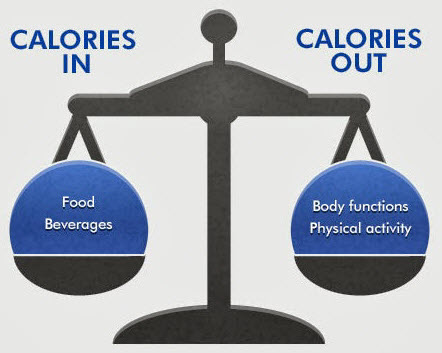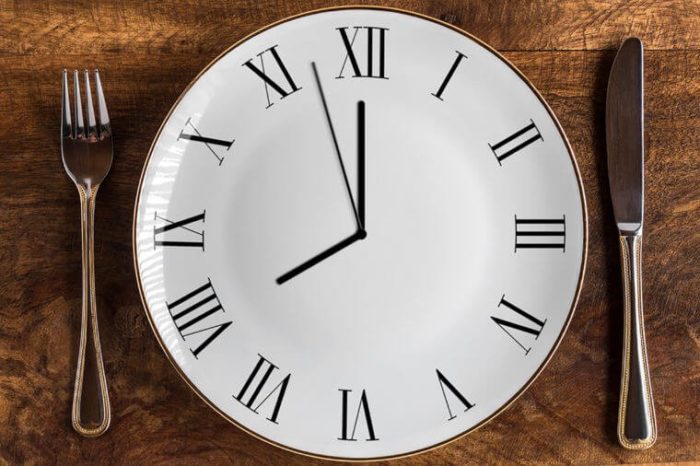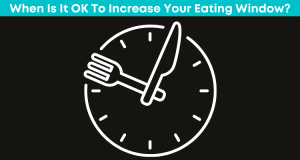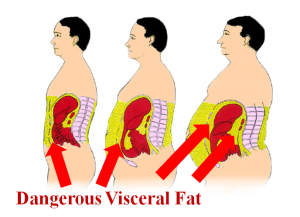Many weight loss diets have a lot of rules and complexities.
Intermittent fasting keeps things simple, and it has become a very popular eating pattern to lose weight.
This article looks at 5 reasons why intermittent fasting and weight loss go hand-in-hand.

What Is Intermittent Fasting (IF)?
Intermittent fasting (IF) is an eating pattern where you strategically skip one or more meals for a set period of time.
So unlike other diets, the focus is not on how to cut calories from each meal, but rather cutting out the entire meal itself.
This makes IF one of the least complex eating patterns to follow and is one of the big reasons behind its growing popularity.
The other main reason is how useful it is for losing belly fat and its associated health benefits.
Summary: Intermittent fasting is an eating pattern that involves strategically skipping meals rather than focusing on calories.
1. Weight Loss Requires A Caloric Deficit… Intermittent Fasting Does This Automatically
The reason any weight loss diet works is because it reduces your total calorie intake.
This means you’ll burn more calories than you consume (called a caloric deficit), leading to weight loss.
Intermittent fasting is no exception to this rule.
Skipping entire meals greatly reduces your calorie intake… So much so that you don’t really have to worry about calories in the meals you do eat.
For example, you’ll save about 500 calories each day by skipping a breakfast of peanut butter toast and orange juice, as well as whatever you might eat or drink for morning tea.

Given the average woman might aim for 1600-1800 calories per day to lose weight, that’s a whopping 30% of calories saved instantly.
If you skip the morning food, even indulging in two large 750 calorie meals later that day, plus a 300 calorie dessert (totalling 1800 calories) would keep most on track for weight loss.
Summary: Weight loss requires you to consume fewer calories than you burn. Missing one meal per day by fasting can save around 30% of calories in one go.
2. Intermittent Fasting Helps You Lose Actual Fat, Unlike Most Diets
When someone says they want to lose weight, they actually mean they want to lose body fat.

Ideally you don’t want to lose muscle mass, nor do you want to lose much water (such as when you first cut carbs or if you do a detox). This type of weight loss does not reduce fat stores and serves no good purpose.
Research indicates that fasting helps you lose more fat mass and less muscle mass or water weight than very low calorie diets or weight loss cleanses and detoxes.
This review study found that intermittent fasting helped people cut 4-7% from their waist circumference over a period of 24 weeks. That means they lost actual belly fat, which is the harmful fat around the organs.
These findings are in line with a more recent review study that looked at all the current evidence.
The researchers found that compared to following a very low calorie diet (800 calories or less) a type of intermittent fasting called alternate day fasting caused an average of 8.4 lb (3.8 kg) extra fat loss.
Summary: When you lose weight, you want it to come from fat stores and not muscle or water. Research indicates that intermittent fasting causes more fat loss than a very low calorie diet.
3. Intermittent Fasting May Preserve Muscle Mass That Is Usually Lost When Dieting
Most weight loss diets cause you to lose fat and muscle, which is a big problem.
Maintaining muscle is fundamental to ensure your metabolic rate doesn’t drop and just to support a healthy weight loss.
Failing to do so means any fat loss will come back fast, such as what happens with every Biggest Loser contestant.
According to the authors of the review study mentioned above, fasting may be more useful than regular calorie restriction for many overweight patients because of greater loss of body fat, and better preservation of muscle.

Another study found that 25% of weight lost was muscle mass in normal calorie restriction diets, compared to just 10% lost in intermittent calorie restriction diets.
The current studies in this area are preliminary though, and the fact remains that weight training and a high protein diet are the most important aspects for building and maintaining muscle mass.
So if you do try intermittent fasting, ensure each of your meals contain a quality protein source like eggs, meat, fish or legumes.
Summary: Research suggests that intermittent fasting can help preserve muscle mass while you lose fat. This must be coupled with resistance exercise and a high protein intake though.
4. Intermittent Fasting Is Useful When We Gain The Most Weight- The Holidays
Weight gain occurs gradually over years or decades.
The amount we gain in a year isn’t consistent though… it spikes sharply over the Thanksgiving and Christmas break.
In fact, research shows the period from mid-November to mid-January is responsible for around 50% of weight gained in a 12-month period.
Therefore minimizing Christmas weight gain each year will go a long way on the scales.
Problem is following a restrictive diet during the festive period means you have to track calories, macronutrients or miss out on all the good things. And nobody is going to do that.

However, what does work is alternating periods of eating lots with periods of eating very little… a.k.a. intermittent fasting.
If you know lunch at your in-law’s will be epic, skip breakfast entirely, and even consider just a light dinner the night before.
Alternatively, choose to miss a meal or two the day after feasting, that way you don’t have to miss out on any of your favourite treats.
Summary: Most weight is gained around the Christmas holiday period. Intermittent fasting is an eating pattern that minimizes your excess calorie intake yet allows you to enjoy festive feasts without restrictions.
5. Intermittent Fasting Does Not Cause Yo-Yo Dieting Or Hunger Cravings
The term yo-yo dieting refers to the cyclical loss and gain of weight over time, akin to a yo-yo moving up and down.
This yo-yo effect occurs among extremely restrictive and unsustainable diets that cause shifts in your hunger hormones. This is why you end up with almost uncontrollable food cravings and feelings of starvation.
Think water fasts, Goop detoxes and cleanses, and very low calorie diets.
Recent research indicates that 24 hours is not enough time for severe calorie restriction (eating 25% of your daily calorie requirements) to kick your appetite hormones into overdrive (13).
Said another way, when fasting is broken up into intervals it doesn’t cause the yo-yo effect.
That means intermittent fasting can significantly cut calories without any major impact on your feelings of hunger.
Summary: Research shows that one day of severe calorie restriction is not enough to negatively influence your hunger hormones, which is what occurs during yo-yo diets.
How To Get Started With Intermittent Fasting
There are several types of intermittent fasting you can follow:
- The 16/8 or Leangains Method: Fast for 16 hours per day and eat in the remaining 8-hour window. Most people will skip breakfast and eat from 1pm to 9pm for example.
- The 5:2 Diet: Eat normally for 5 days of the week, but only eat up to 600 calories on the other two days.
- Eat-Stop-Eat or Spontaneous Fasting: Fast for a 12 or 24 hour period multiple times per week. There is no real schedule for this one.
- Alternate Day Fasting: Fast for one day and eat normally the next day. Continue to alternate days of fasting and normal eating.
- The Warrior Diet: Fast daily for 20 hours with a 4 hour eating window
Should You Try Intermittent Fasting For Weight Loss?
There are many effective ways to lose weight, and intermittent fasting is one… but it’s one of many.
Some people find missing just one meal extremely challenging, so it’s definitely not for everyone.
Also know that some women report issues with menstruation and even fertility problems from long-term fasting. I recommend joining this Facebook group if you want to join the discussion.

And as always you should consult with your doctor before trying any new diet, especially if you take medication.
However, if you are someone who:
- wants to lose belly fat
- is able to skip meals or at least breakfast without complaint
- wants to spend less on food
- wouldn’t mind going to the toilet fewer times in a week
- wants to do a lot less cooking and cleaning
… intermittent fasting could be game-changing for you
- Article sourced from DietvsDisease.org, access the original article by clicking here
- Article Authored by
Posted By James, Warrior Network

James is the founder of Warrior Network & helping people around the world get lean & healthy again. Also enjoys working out, fasting, music, movies, being out in nature, coastal walks, personal development and living as freely as possible!






